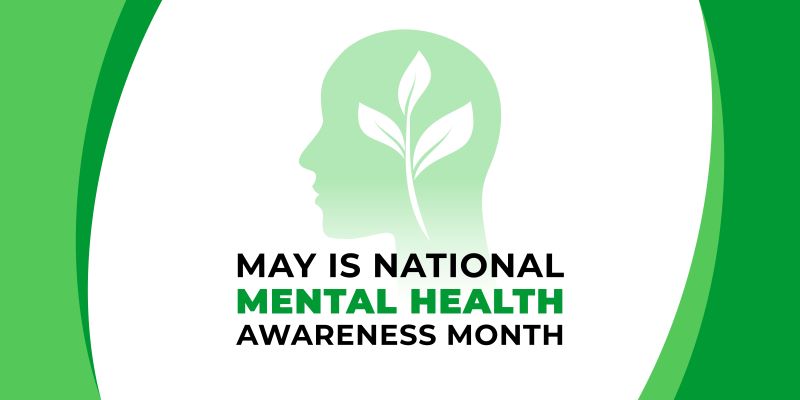In this edition
- Improve Your Mental Health by Staying Connected, Informed and Safe Online
- Knife Skills – Using the Knife Safely
- Celebrate Cinco de Mayo
- Mango Salsa
- SNAP-Ed
About the Newsletter
This month's newsletter includes how to improve your mental health by staying connected, informed and safe online, knife safety and skills, how to make a burrito bowl for Cinco de Mayo and a delicious mango salsa that can also be made with peaches or pineapple.
Improve Your Mental Health by Staying Connected, Informed and Safe Online

National Mental Health Awareness Month logo
Research shows that being social enhances your emotional and mental well-being. Being social online comes with benefits and risks. Devices, such as smartphones, computers and tablets enable us to communicate with relatives and friends and meet new people. Staying in
touch virtually, through video chats, text
messages or social media, helps us feel less isolated. It reduces feelings of loneliness, bringing a sense of comfort and community. We canread online books, watch movies, listen to music, find information, learn new skills, post pictures, look at picture’s others posted, play games (which can strengthen brain functioning), visit museums, attend performances and travel.
The fact that you can communicate whenever you want, wherever you are, and to whomever does not mean that you should. Wanting to connect with someone right now might not be shared. Those we want to talk to may be accessible but not available. Similarly, the fact that we receive an email or a message does not mean that we
need to respond right away.
Research suggests that being glued to our screens 24/7 is harmful to our health. Also important is not the time we spend using our electronic devices but how we use them.
ARCS refers to four ways to better control using your devices:
A = Avoid negative people and sites - Being online means exposing yourself to messages that may cause anger, fear, hatred and other harmful emotions.
- If some people in your social network post messages that trigger the above emotions, mute, unfollow or unfriend them. Surround yourself with people who are positive.
- The internet is full of disinformation. Some news and posts may try to scare and anger you. Verify that the news that causes those emotions is indeed true and credible. Follow the most reliable news outlets. If online posts triggering negative emotions do not appear in reliable sources, they are probably not true. Reliable sources often come from educational institutions (.edu), organizations (.org) and government sites (.gov).
R = Resist distractions - Your devices send you constant notifications about breaking news, emails, messages, or phone calls. One survey reveals that Americans check their smartphones 80 times a day. Checking what’s going on immediately creates a false sense of urgency. This can interrupt what you are doing and stress you out. Being dialed in 24/7 is not good for your mental well-being. People who respond to their phones more often have higher stress levels.
- Create a schedule for checking emails. Checking them two to three times daily lets you run your email rather than letting it run you.
- Make sure you tell others so they can respect your boundaries.
- Turn off the notification option on your devices so you are not constantly reminded about what you are missing.
C = Curb your screen time - With the 24/7 availability of online resources, you spend an increasing amount of time staring at a screen. Many of the activities online are designed to be addictive. Decide how much time you want to be online, what hours and for how long.
- Designate a screen-free time when you will not be on your device.
- Avoid using your device two to three hours before going to sleep.
- When you engage in an activity or a face-to-face conversation, mute your phone, place it out of sight and be fully present in the moment.
S = Shield your privacy - Scammers target people who might be vulnerable and are new to the internet. Beware of emails or messages from people you do not know and even people you do – especially if the message looks off or not typical for that individual.
- Never give your personal information online (e.g., social security number, credit card numbers, address, passwords).
- If in doubt, verify the organizations and people who are asking for your information. Call the organization, asking for the person who sent you the email to see if they really sent it.
Try the ARCS principles for a week. Take note of how it makes you feel.
Most important: stay connected, informed and safe online!
Simon Gottschalk is a professor emeritus of sociology in the College of Liberal Arts at the University of Nevada, Las Vegas. He is co-author of a publication on Mental Health Care in Nevada titled “In the Social Health of Nevada: Leading Indicators and Quality of Life in the Silver State.”
Knife Skills – Using the Knife Safely

Knife Skills
- Watch your fingers. Tuck your fingers toward your palm on the hand that is holding the food.
- Lead down with the tip. Angle the tip of the knife toward the cutting board.
- Slice. Cut through the food with a slicing or sawing motion. Don’t just push down.
- Create a flat surface. When working with round foods like onions or potatoes, cut them in half first. Lay the flat side down, then keep cutting.
Visit Cooking Matters for more information on cooking basics.
Celebrate Cinco de Mayo

Burrito Bowl
How to Make Meals Fast - Build a Burrito Bowl
Throw together precooked or leftover protein, veggies and brown rice for a tasty meal. Top with salsa or avocado.
Visit Cooking Matters for more information on cooking tips.
Mango Salsa

Mango Salsa
Ingredients
2 large ripe mangoes
1 small cucumber
2 medium green onions
1 medium jalapeño pepper
2 medium limes
½ teaspoon salt
Pinch of cayenne pepper
1 medium bell pepper, optional
¼ cup fresh cilantro, optional
Visit Cooking Matters for the mango salsa recipe.
Instructions
- Rinse mangoes, cucumber, green onions, jalapeño pepper, limes, and bell pepper, if using.
- Peel mangoes. Cut mango flesh from the pits.
- Cut cucumber in half lengthwise. Remove seeds. If using bell pepper, cut in half lengthwise. Remove stems and seeds.
- Dice mangoes, cucumber, and bell pepper, if using. Finely chop green onions.
- Cut jalapeño pepper in half lengthwise. Remove stems and seeds and dice.
- If using, rinse and chop cilantro.
- Cut limes in half. Squeeze juice from each half into a medium bowl. Discard seeds.
- Add mangoes, cucumber, green onions, jalapeño, salt, and cayenne pepper to bowl with juice. If using, add bell pepper and cilantro. Mix well.
- Cover and refrigerate for at least one hour before serving.
Chef’s Notes: Mangoes usually feel a little softer when ripe. If mangoes are not in season or not in your store, use canned peaches or pineapple, packed in juice. Drain before using.

SNAP-Ed logo
An EEO/AA institution. This material was funded, in part, by USDA’s Supplemental
Nutrition Assistance Program (SNAP), an equal opportunity provider.
Visit Nevada SNAP-Ed


